Croatia and Israel Discuss Protocols Facilitating Travel
ZAGREB, 12 March, 2021 - Croatia and Israel have started talks on travel and protocols for tourists from the two countries, Tourism and Sports Minister Nikolina Brnjac said on Friday, hopeful an agreement would soon be reached.
Brnjac and Israeli Ambassador Ilan Mor met on Thursday to discuss the travel protocols with the aim of reaching an agreement that would facilitate travel for tourists from both countries during the pandemic.
The minister expressed satisfaction with the meeting at which she informed the ambassador of other activities of her ministry, including a project with the website "Safe stay in Croatia", which provides visitors to Croatia with information on locations and epidemiological restrictions in force as well as recommendations for health safety.
She spoke of special safety protocols which anyone applying for the "Safe stay in Croatia" certificate must comply with and explained how businesses with that certificate would be monitored.
For more about travel in Croatia, follow TCN's dedicated page.
Croatian Smart Table 'TabORDER' Makes Life Easier for Caterers and Guests
February 16, 2021 – As one of the most popular activities in Croatia is having coffee at a bar, and while the coronavirus pandemic disables regular work for caterers, imagine how it would be easier for both caterers and guests if the waiter would bring the order over after one tap on the screen. With the innovative Croatian smart table, it seems like this scenario will soon be possible.
TabORDER, a Croatian smart table, offers contactless ordering and payment in catering facilities. It has a wooden surface with a built-in computer, electronics, a touch screen, and thick glass to protect against damages and spills.
The software part has an ordering application that includes the complete offer of an individual catering facility. It enables quick ordering without a waiter, sending the order directly to the cashier. It is also possible to pay via the table, which is another benefit in preventing the spread of coronavirus infection by reducing unnecessary social contact.
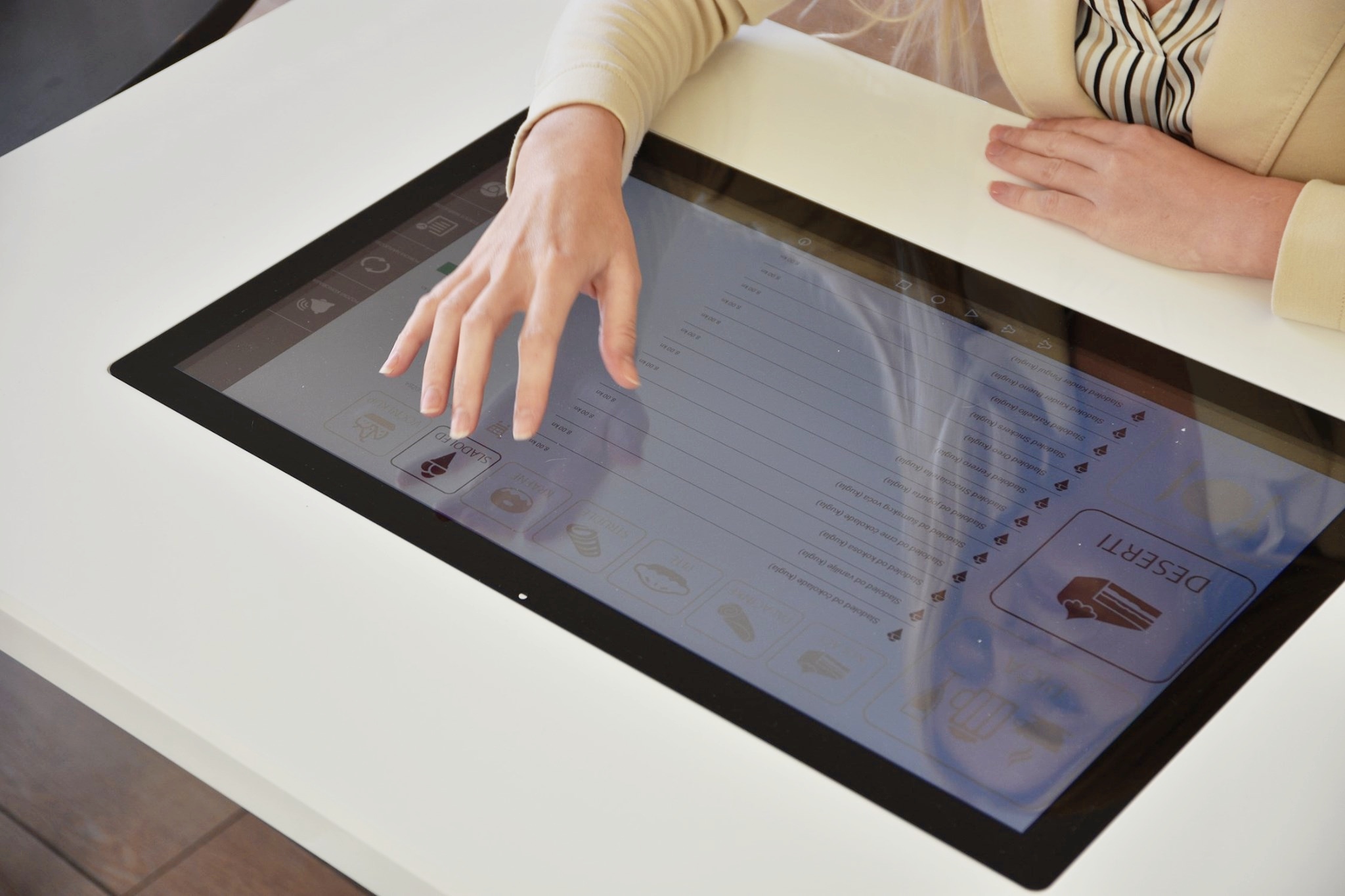
TabORDER / info-MINOVA
The ordering table can also serve as an interactive desk for using the Internet. It also has advertising space that can be an additional source of income for owners/caterers. To adapt to all caterers' requirements, mobile or tablet applications are also offered as a cheaper option of the contactless ordering system.
Young people and children loved Croatian smart table
Different screen, table, and stand sizes are available where design, material, top panel thickness, and stand can be picked.
The idea came from Mihaela Popović, the owner of the company info-MINOVA, the manufacturer of TabORDER. Like most people, Mihaela once waited for an order in a cafe when she got the thought of a smart table that would speed things up. How is it even possible that at the time of the greatest digitalization, something like this had not already been planned, Mihaela wondered.
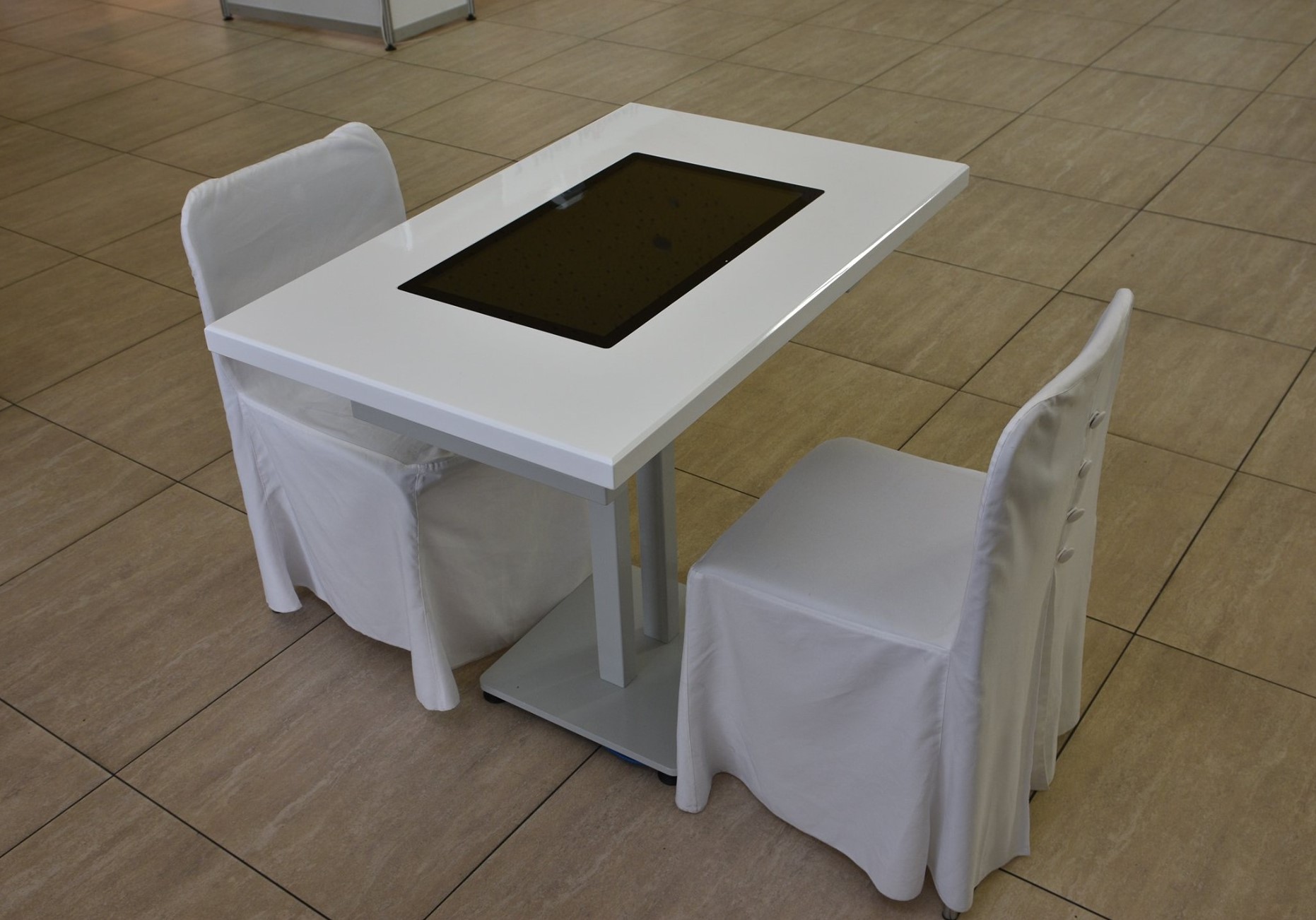
TabORDER / info-MINOVA
"I reviewed existing similar solutions for applications, panels, and smart tables, but I didn't like them. At that time, an entrepreneurship competition had just come out where innovative ideas scored the most, so I wrote the first business plan for a smart table and suggested it to my brother. He is an expert in hardware and software solutions. We did not win the competition, but we decided to start the development ourselves. The prototype was made and exhibited for the first time at INOVA 2018 in Zagreb, where it received a lot of attention and interest from visitors, especially young people and children," explains Mihaela.
Croatian smart table soon in Zagreb and abroad?
This smart table has also been recognized at numerous innovation fairs. So far, TabORDER has won three awards: at the 7th Innovation Fair in Bjelovar in 2019, the innovation award at INOVA 2019 in Zagreb, and even the award at the ITE Expo Innovation Fair in London in 2019.
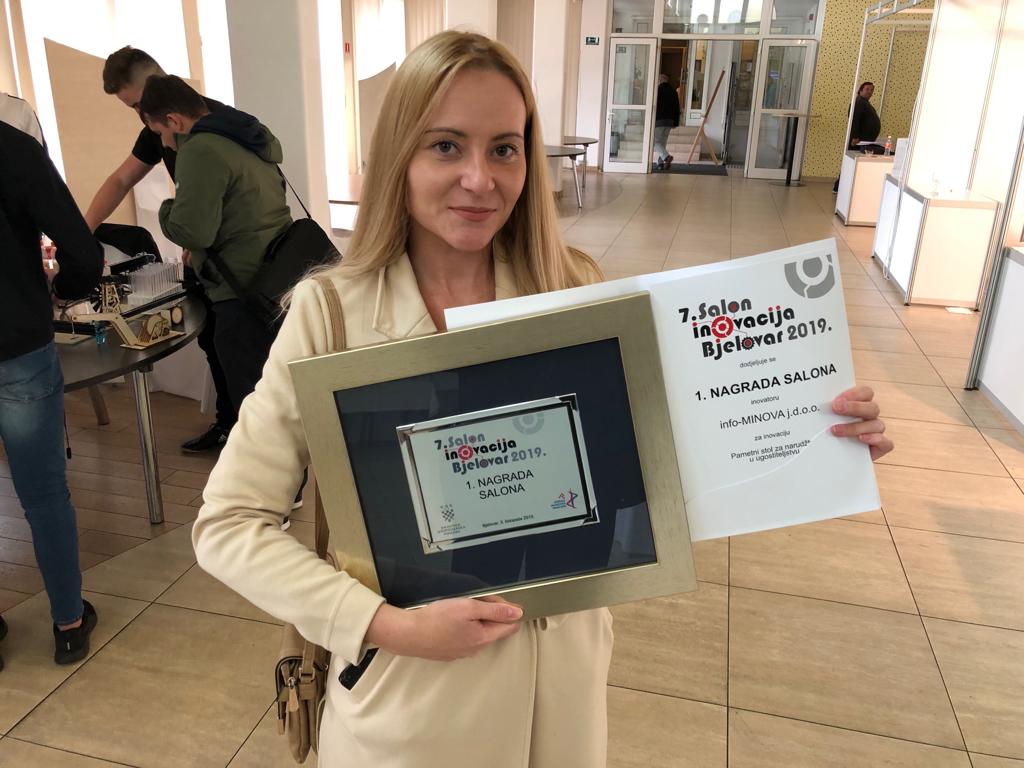
Mihaela Popović, owner of the info-MINOVA company and conceptual initial of the Croatian smart table TabORDER / info-MINOVA
Will we soon really be able to order food and drink via TabORDER? As Mihaela says, that will be possible soon in Zagreb and maybe even abroad. So far, they have focused on functionality and product testing, but the commercialization has begun in the last month.
"We have recently been realizing a facility that would have a complete system of our smart tables that offer digital ordering and advertising, and the facility should be opened in Zagreb soon. We also have several inquiries abroad, so we are arranging offers for them," says Mihaela.
Info-MINOVA was established in August 2018 as a continuation of the family business and brings together a team of design, electronics, hardware, and software experts. Their main activity is design, but they also create websites, applications, and sport scoreboards.
Solving tourism problems with Croatian smart table
Besides caterers, TabORDER could also be helpful to tourism workers, especially in hotels, as it reduces unnecessary social contact, which is currently extremely important for tourists when choosing a destination during a coronavirus pandemic. With the digitization of all systems, it enables better control and organization of the business. Mihaela emphasizes that they can offer similar solutions to all other tourism sectors and redesign the systems to their needs.
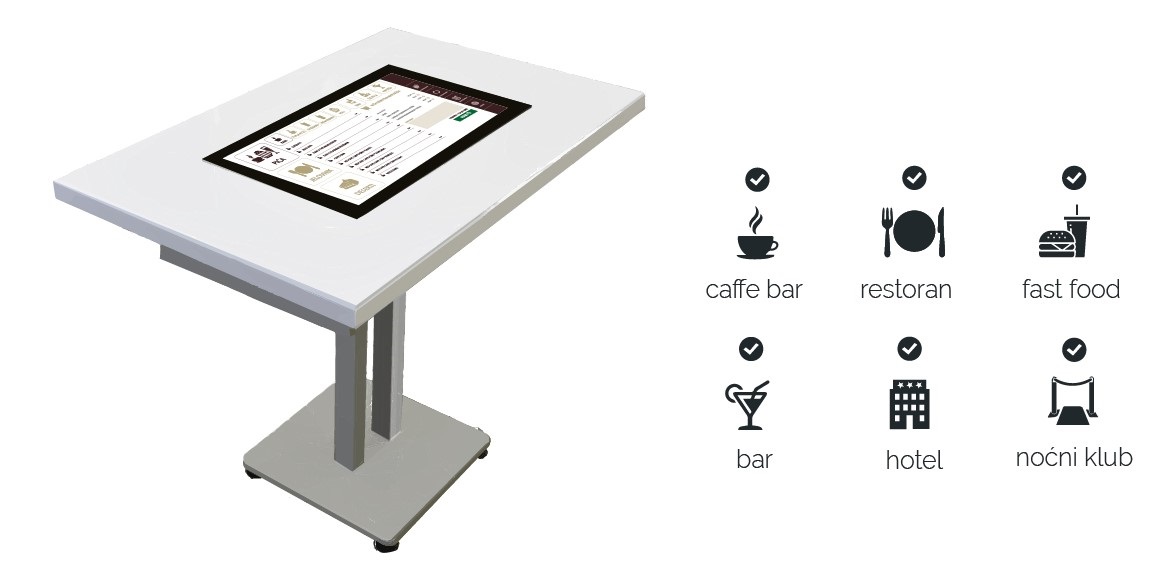
TabORDER / info-MINOVA
Although TabORDER seems like an excellent solution for catering facilities and tourism, caterers' first reactions were not good. Several caterers were skeptical. Given that the first TabORDER prototype was created before the coronavirus pandemic, it was considered a significant investment, and that it was not yet time for it.
TabORDER was not supported because some were not satisfied with the existing applications they used, which also created further mistrust. As an innovator and entrepreneur, Mihaela feels responsible but also insecure in these uncertain times. However, she is sure that TabORDER responds to all current challenges.
"For the last year, we have been witnessing the consequences of the coronavirus crisis that were left on all branches of the economy, especially on the catering sector. I believe that it is now necessary to make digitalization and that TabORDER offers complete digitalization while adapting to caterers' needs and capabilities," says Mihaela.
To read more about innovations from Croatia, follow TCN's dedicated page.
Croatia is one of the Most Safe Countries in 2021 for Visitors
December 4, 2020 – Accepting all known knowledge of the Coronavirus risk and the announced vaccines, security and risk experts International SOS have published their latest, annual Travel Risk Map. It says Croatia is one of the most safe countries in 2021 for visitors
With the end of the life-halting Coronavirus in sight, thanks to several effective vaccines announced, which country would be best to visit next year? Well, Croatia is one of the most safe countries in 2021 for visitors.
It's been a long, difficult year for everyone. It's maybe hard to believe if you live in Croatia and haven't much travelled outside the country, but the residents of Croatia have had it no more difficult than anywhere else. With only around 4 million inhabitants, there's lots of space in Croatia to move around.
Take in comparison Britain's London. That one city (1,572 km²) alone has 9 million people. Croatia has 56,594 km² for less than half the number of people. But, this generous amount of space in which to move around is not the only reason Croatia is one of the most safe countries in 2021 for visitors.
On 2 December 2020, Total Croatia News published the annual report based on the Global Terrorism Index, identifying Croatia is one of the most safe countries in 2021 in regards to the absence of terrorist threat and effect. Now, according to the latest annual Travel Risk Map, it has been designated that Croatia is one of the most safe countries in 2021 for visitors.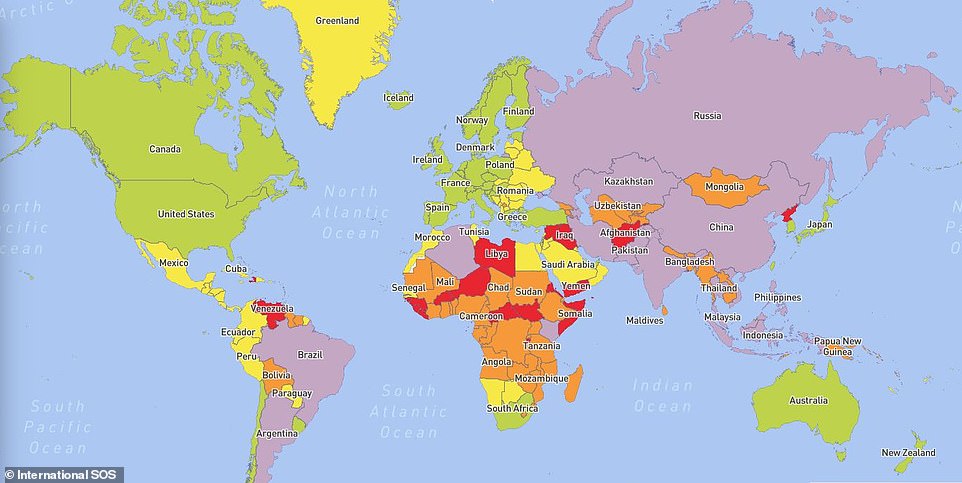 Security and risk experts International SOS's Travel Risk Map for 2021.
Security and risk experts International SOS's Travel Risk Map for 2021.
The map, created by security and risk experts International SOS , ranks the safety of countries across the globe taking into account medical, security and road risks. It assesses the risk of political violence, social unrest, and the threat of violent and petty crimes – and, most importantly this year, the impact of the pandemic.
For the first two categories, countries are given a rating out of five, while road safety is rated out of four based on the mortality rate per 100,000 people. The places with the highest risk level for security issues are mostly in Africa, with South Sudan, Mali, Yemen, Somalia and the Maiduguri region of Nigeria listed under the most dangerous, along with the Donetsk and Luhansk regions of the Ukraine.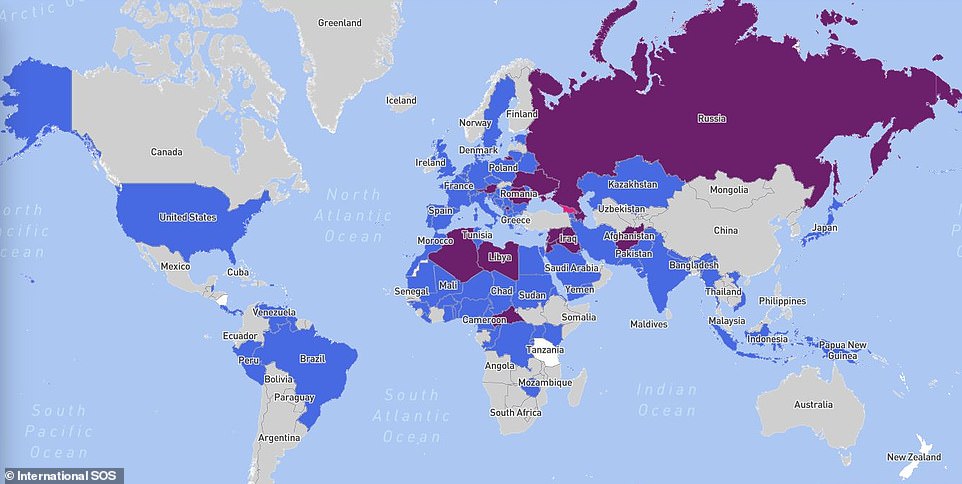 International SOS's map showing the countries with the most and least Covid-19 disruption. Very low-risk countries are marked in white, low risk in grey, medium in blue, high in purple and very high in pink.
International SOS's map showing the countries with the most and least Covid-19 disruption. Very low-risk countries are marked in white, low risk in grey, medium in blue, high in purple and very high in pink.
Very few countries rank above Croatia in the new safety map, New Zealand, Tanzania and Nicaragua among them, meaning Croatia is one of the most safe countries in 2021 for visitors.
For the residents of crowded cities elsewhere in Europe, Australia or the USA who have felt more than restricted in 2020, it might be worth remembering when planning next year's escape that Croatia is one of the most safe countries in 2021 for visitors.
Time To Reflect, As Loyalty Not Luxury Saves 2020 Croatia Tourist Season
September 28, 2020 – The tail end of 2020's unparalleled summer offers opportunity for pause, contemplation and appreciation, as it's loyal and not luxury guests that have saved this year's Croatia tourist season.
In this day and age, things always have to get better. There's no room to sit still. Life without improvement is deemed a failure. Nowhere is this more true than the Croatia tourist season.
The numbers of overnight stays in the Croatia tourist season sometimes seem to be the only measure by which its success is judged. Year after year, the numbers must rise. Any decrease is unthinkable. At the same time, hungry eyes still want more. Some want to reposition themselves. A new class of guest is wanted, from faraway nations. They must be of a better quality. They must stay longer, in more expensive dwellings. They must spend more.
Incredible initiatives are undertaken to turn this want into a reality. But, at the end of the 2020 Croatia tourist season, perhaps it's time to pause and reflect. For this year, it is undoubtedly loyalty and not luxury that's saved the Croatia tourist season.
In the year the coronavirus pandemic hit, arrivals by charter plane and cruise ship were seriously curtailed. So much for the flying visits of premium guests from far-flung lands. Instead, the tourists who came were from much closer to Croatia.
The English language that most on the coast are so familiar with was this year useless. On the beaches of Istria and northern Dalmatia, it was Slovenian, Polish, Czech, German, Slovakian and Italian that was heard. The packed bars of Makarska echoed with the familiar call of 'Đe si, bolan?' (where are you, bro? - in Bosnian dialect). Many of those who came drove to Croatia. And many do so every year.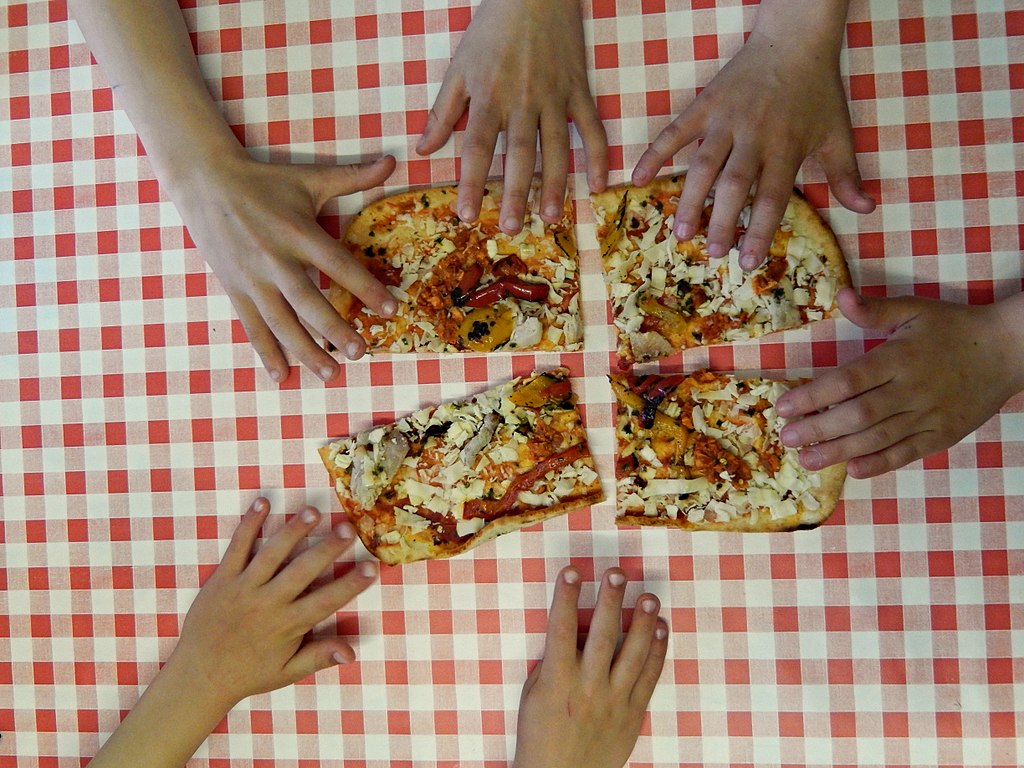 © Jeremy Segrott
© Jeremy Segrott
Sighs and light-hearted jokes about some of these guests persist in some places. “That family come every year, but they only ever order one pizza to share between the four of them.” The choice of footwear of some German-speaking and Czech visitors frequently draws chuckles, in particular, the classic sock and sandal combo. But, just where would the 2020 Croatia tourist season have been without the 60,000 Czech and Slovak visitors who this year arrived by train?
Just two days ago, Jutarnji reported on phenomenal numbers of Polish visitors this year. Would anyone else really have taken the place of the returning family of four sharing a pizza? Just what would the season in Makarska have looked like without bolan?
Croatians are famously very appreciative hosts. On the ground, there's no doubt that such loyal guests are warmly welcomed and thanked each year by accommodation renters, restaurateurs and others. They greet returning visitors with smiles of familiarity and reserve for them their favourite place. In September 2020, gratitude to such guests was echoed by The Croatian National Tourist Board as they launched a new campaign 'Thank you', directed at the tourists who this year chose Croatia.
Perhaps it is time to ensure that this gratitude extends into any grand new initiatives for growth in the Croatia tourist season? Such loyal guests should not be taken for granted, nor forgotten.
Initiative within the Croatia tourist sector is vital. The unlocking of continental Croatia's potential is simply a must. That too of the Dalmatian hinterland and inland Istria. The exploitation of world-class Croatian assets such as nature, agriculture and health and wellness services are also perfectly on-point. The desire to attract a better class of bigger-spending visitor to luxury holidays on the Croatian coast should surely be a lower priority. After all, eyes that covet can all too frequently fail to appreciate that for which they should already be thankful.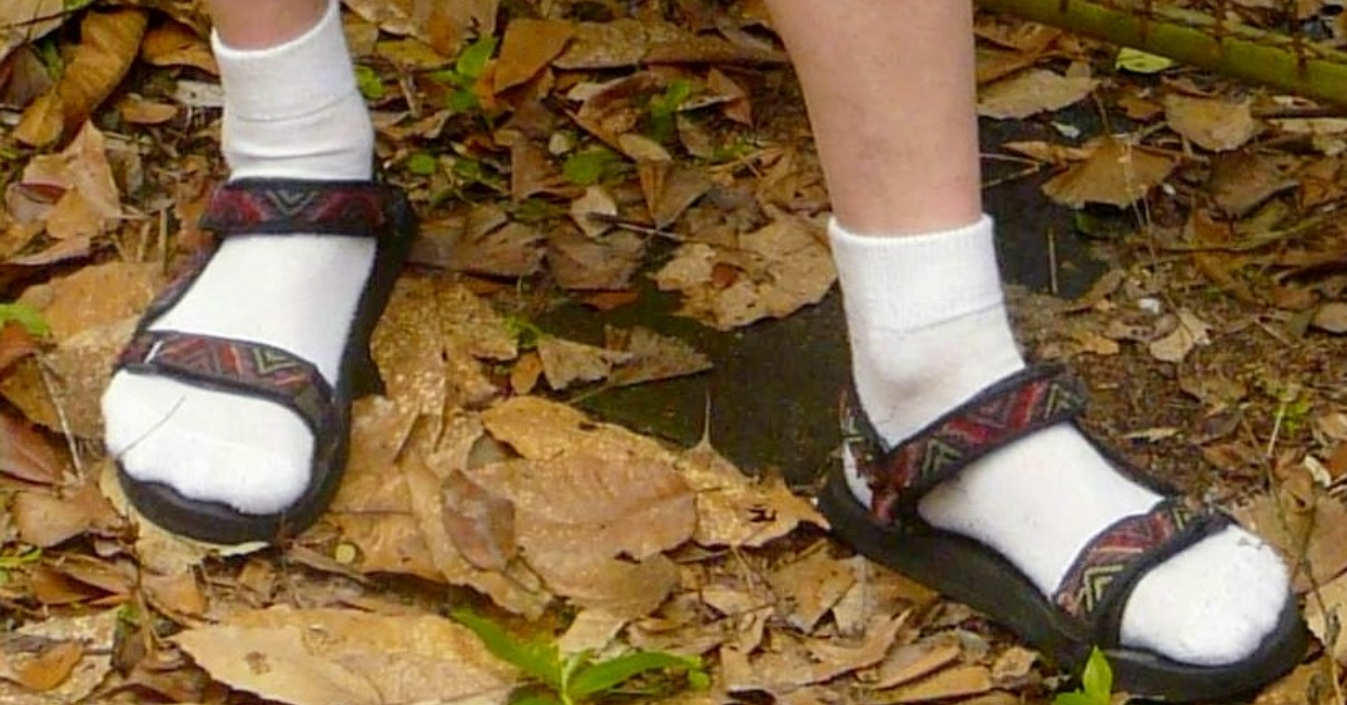 © Oddman47
© Oddman47
Lead image adapted from an original photograph by © Marco Verch
For the latest travel info, bookmark our main travel info article, which is updated daily.
Read the Croatian Travel Update in your language - now available in 24 languages
Croatia First in World to Use Contactless Card Payment Tech for Online Customer Reviews
July 24, 2020 - Croatia first in the world to use contactless card payment technology (NFC) for online customer reviews, a game-changer for business globally
In the modern era, there's no better promotion for your business than online customer reviews. Comments and ratings on platforms like Trip Advisor, Google and Facebook have replaced slow and unreliable word-of-mouth recommendations in the digital age.
But, how to get those reviews? A huge proportion of goodwill from satisfied customers is lost forever the moment they step out of the door. They can forget every detail of your business, their experience or maybe they just don't find the time.
Review Booster Pro, an innovative platform from Dubrovnik, offers the best solution yet. It uses NFC – the same technology used by credit cards for contactless payments – to facilitate on-the-spot online customer reviews in super-fast time. It's a simple solution that could be a game-changer for business globally.
“I'm the CEO and owner of the Mint Media digital agency,” explains Ivan Ivušić who has developed Review Booster Pro.”We work with a lot of clients in the tourism sector. Over the past few years, we got a lot of requests from clients about how to improve their online reputation. Their main concern was how to improve their ratings and increase their number of reviews of Trip Advisor, Google, Facebook and other platforms, in order to get more visibility and more customers.”
“We tried many different solutions; business cards with QR codes, something you scan with your mobile phone which would take you to a web page where you write reviews. But, the main problem was the speed. Once customers leave a venue, they don't find the time to write reviews or they don't remember the name of your business. So, the conversion rates were low. So, we needed something quick and simple, so customers can leave reviews on the spot. This is what the market needs.”
Their solution was to employ NFC - Near Field Communication, the technology you use to pay contactless with your credit card. All newer mobile phones are fitted with this technology. Businesses signed up to Review Booster Pro have RBP boards, which they present to customers after their experience – for instance, while you're waiting for your restaurant bill. You simply wave you phone over the board, the phone's operating system reads the chip, your web browser opens automatically and takes you to the RBP landing page of the business you're in. You then select which of the platforms you're already signed up to - Trip Advisor, Google, Facebook etc. - and leave your online customer reviews.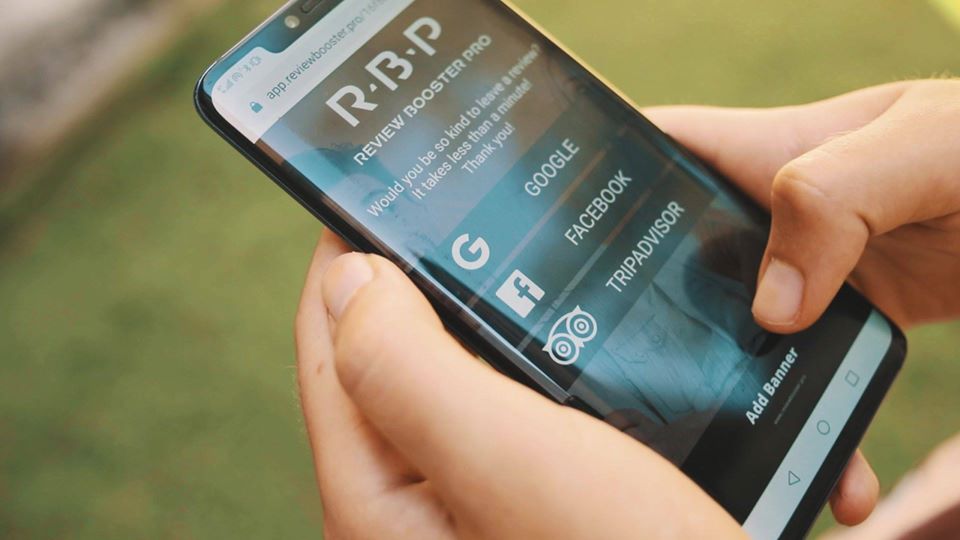
© Review Booster Pro
“The RBP boards are around the size of a large mobile phone – and these can be presented to the customer or even positioned permanently on every table in your bar or restaurant; hotels, dentists, hair and cosmetic salons, retail stores, tourist guides and agencies are also some of our clients,” explains Ivan. Aside from encouraging simple and super fast reviews, businesses using the RBP platform obtain other benefits. On their RBP landing page, where they can place their branded logo and individual text, they can also use banner advertising space to promote existing partners or market different sections of their business. For instance, while a customer is leaving a review of the hotel bar, they will be shown the details of what's on offer in the hotel's spa.
Business owners can measure the clicks on each individual board they have. Therefore, a restaurant owner will be able to see which of his staff is obtaining the most reviews. Previously, such information would have been complete guesswork, unless an individual server is specifically named by a customer in a review.
“All of our current clients were already well aware that this is exactly what they need,” says Ivan. “It took about 10 minutes to sell each of them this product. In our extensive preliminary testing, businesses that were averaging 3 reviews a day went up to receiving 15 reviews per day. It's really a game-changer.”
Future plans for RBP are extremely exciting and they are already searching for ways to move the technology into different forms – imagine having the RBP chip implanted within a laminated page at the end of your restaurant menu. But, for now, the next step is to be recognised by one of the biggest three review sites.
“Trip Advisor has a separate platform (RCP) which you can partner with, to offer projects that will get them more reviews,” says Ivan. “Our product will be particularly beneficial to them because it not only increases their number of reviews, it also increases user acquisition.”
“We are processing our application to become one of these partners. They have different tiers of partners, so if you are successful and reach the top, Trip Advisor then promotes you as a solution to all the businesses worldwide who hold accounts on their platform. That's our goal. And I have every confidence we will reach it because all other solutions rely on software, many on downloading a separate app. We found no other solution in the world right now that is using NFC technology for this.”
From Osijek to Makarska, Booking.com Users Rate Croatian Hosts
What do Croatian and international travellers think of their hosts when staying in private accommodation? How do they rate them, how much interaction is too much and are privacy and inside information the key?
As Lea Balenovic/Novac writes on the 9th of April, 2019, almost two thirds of Croats believe that the host is a key factor when staying in an accommodation facility, and those who are the best rated in the Republic of Croatia, both from domestic and foreign guests, can be found in in Rakovica, Osijek, Bibinje, Korenica, Kaštela, Makarska, Brela, Senj, Trogir and Podstrana.
They are the results of research conducted by the world's leading rental company, Booking.com, on a sample of 21,500 travellers worldwide. As the survey showed, 63 percent of international travellers and 62 percent of Croatian travellers think that their stay was better because of their engagement of the host who did everything they could to make it a better stay for them.
Most travellers want to feel "at home," as they have indicated in such surveys. For 62 percent of international travellers, the main advantage of non-hotel accommodation is the ability to take advantage of the knowledge and information available from the host and decide to stay in a property owned by someone who actually comes from the region in which the property is located. The same goes for 48 percent of Croatian travellers.
Nearly half of the international travellers who partook in the survey, or more specifically 45 percent of them, and 59 percent of Croatian travellers consider the local knowledge and information at their disposal from their host important for their overall budget because they hope to be given insider advice that will help them save some cash and avoid potential tourist traps.
However, while it seems that all travellers who took part in this survey generally consider the same things to be significant, each traveller is looking for a different type of engagement from their host. Therefore, some travellers are satisfied with a simple warm welcome, while others have slightly higher expectations from their hosts.
For example, 52 percent of international passengers and 40 percent of Croatian travellers believe that their host should only be seen once during their stay in order to make them feel welcome, and more than a third of international travellers and almost the same number of Croatian travellers expect their hosts to contact them only during their arrival, registration, and then again when they eventually check out and leave the premises.
What is often even more challenging to hosts is the fact that many travellers also expect them to have some sort of sixth sense and know just how much of a personal touch is needed for each traveller. 69 percent believe that hosts should intuitively know the right amount of time they should be spending with their guests, and that is also what 73 percent of Croatian travellers think. For four out of five international travellers and the same number of travellers from Croatia that means respecting their need for personal space, which means that the feeling of privacy is key.
The hosts also agree. Namely, nearly 80 percent of Croatian hosts think that the most important thing for guests is to be able to properly ensure their privacy.
"Our research reveals that it's very important for the owners and managers of accommodation facilities to find a balance which ensures the best experience, regardless of whether guests are staying in a vacation home, an apartment, in accommodation with their hosts or any other type of facility," explained Olivier Grémillon, the vice president of Booking.com, adding the fact thatt "what is crystal clear is that there is nothing like the ability of ordinary people to turn something into an unforgettable experience."
Make sure to follow our dedicated lifestyle and travel pages for much more.
Click here for the original article by Lea Balenovic for Novac/Jutarnji
3T Conference 2019 - Virtual Worlds Are Coming
The third edition of the 3T conference took placeon March the 12th in the Kaptol Boutique Cinema with various topics related to tourism and technology.
This the confirmed connection of tourism as the most important industry in Croatia and technology as a great support to tourism. The conference's director, Oleg Maštruko, opened the conference and pointed out the high share of tourism in Croatia's BDP. He emphasised that this and the digitalisation of services shouldn't be self-serving, but act as a tool to increase the efficiency and profitability of tourism and other sectors.
He said the framework for this years' conference was partly developed from topics covered in the previous two conferences.
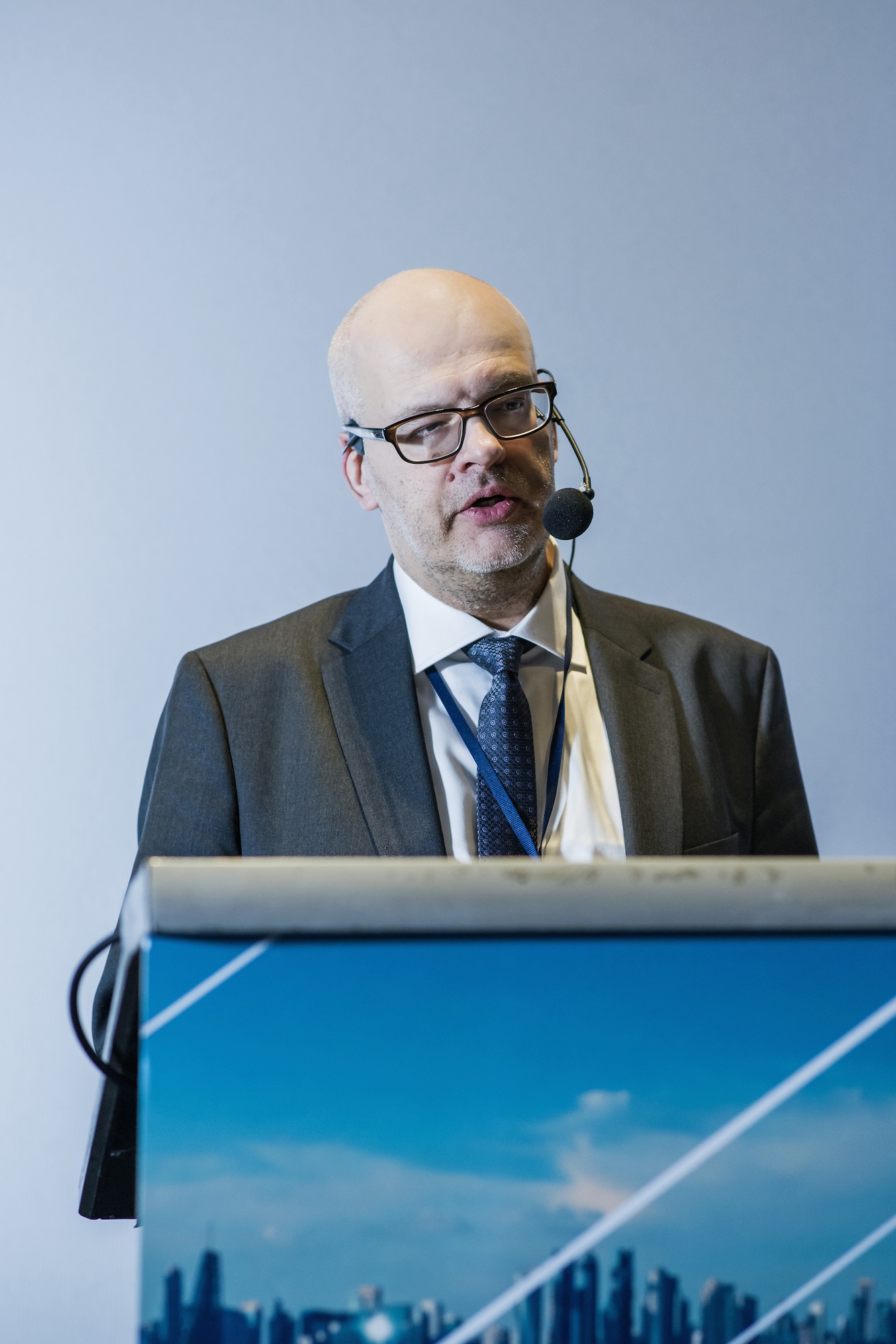
The keynote speaker, Miikka Rosendahl, from the leading VR studio in Europe - ZOAN, presented to the audience how Helsinki got to be the European Capital of Smart Tourism and how they built the virtual platform for Helsinki. This virtual platform plans to attract at least a million virtual tourists in 2019. This complex project was realised by using different technology solutions through 3D modelling. VR Helsinki is made to be the digital platform with which visitors can tour Helsinki not just in the actual surroundings, but experience the city from the beginning of the 20th century, buy designer Finnish products, or send them to friends.
It also allows users to meet other virtual tourists from all over the world and enables them to explore Helsinki together.
The company works closely with many tourism stakeholders in Finland such as Finnair, and the plan is to fully launch in 2019. The question for conference participants at the end of the lecture was which locations should be virtualised in Croatia, and what and where exactly would be the most attractive locations for virtual tourists to visit.
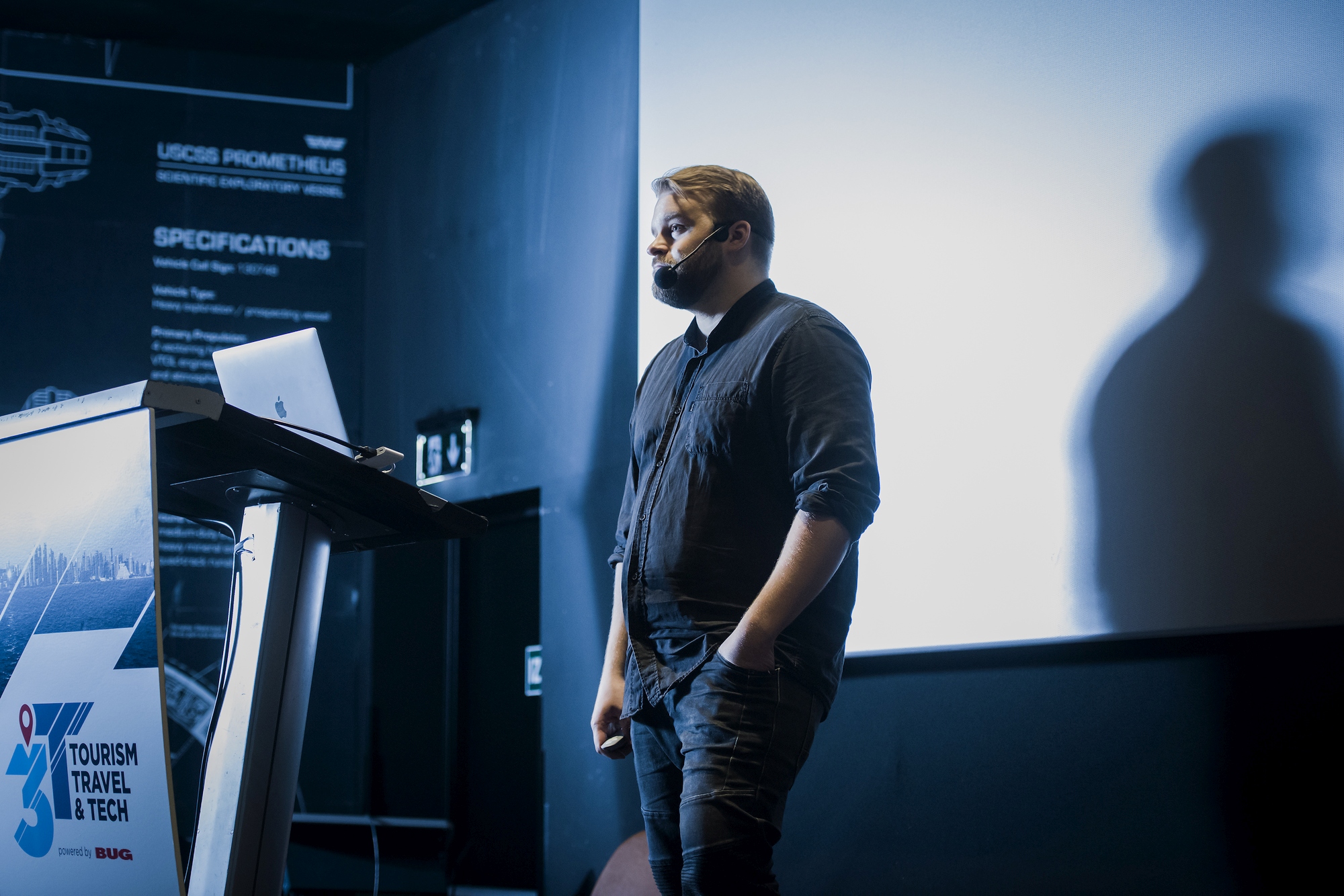
The second keynote speaker was Natalija Havidić from the Ministry of Tourism, and she presented the digitalisation project for public services in the tourism sector as part of e-Croatia 2020 project.
The plan is to develop public digital services by the end of 2020 and improve and connect services in the central tourist database, as well as improve the e-visitor system and the website Croatia.hr, as well as other e-services. All the data collected would be used for business intelligence in tourism and other related services.
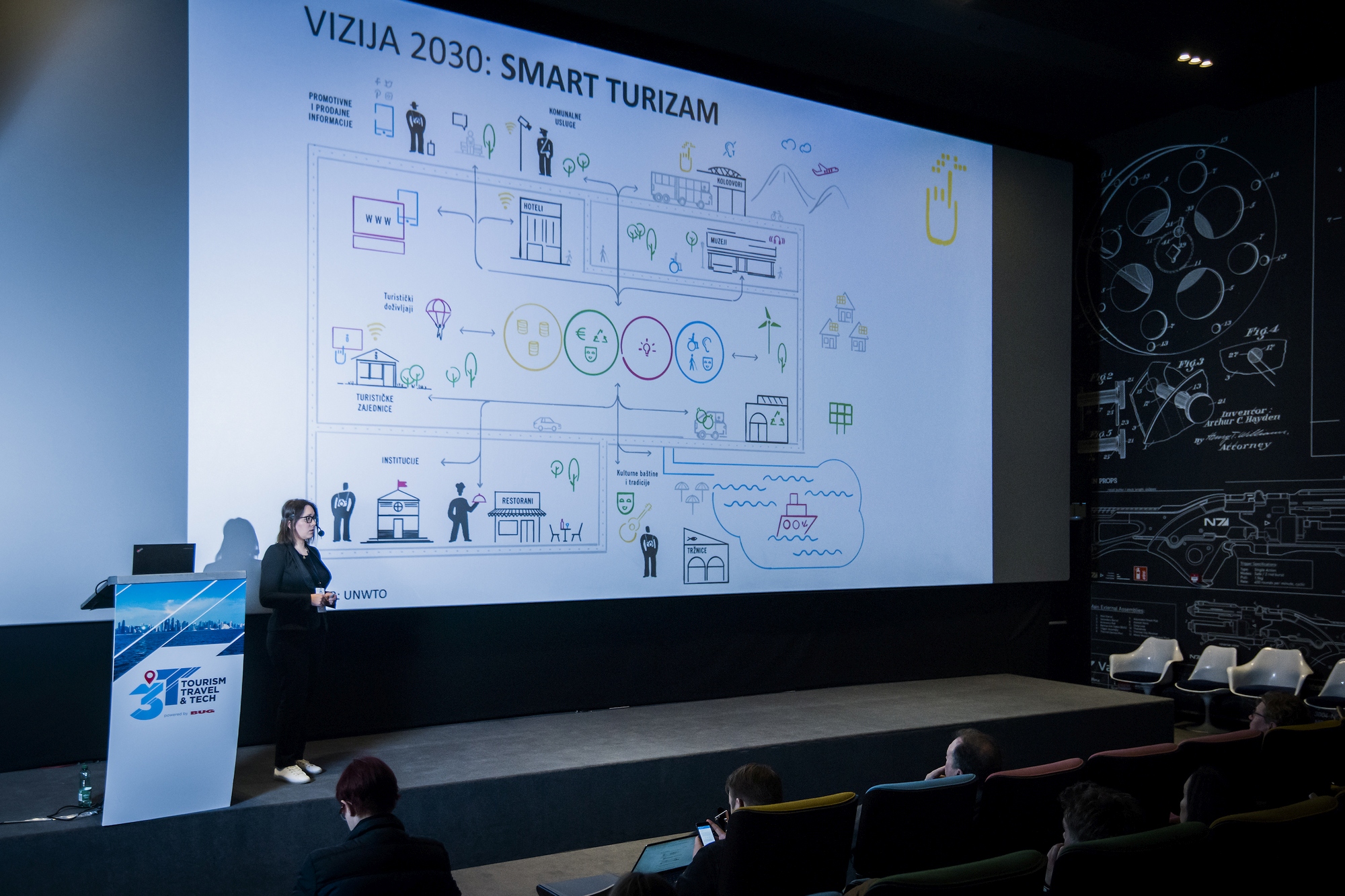
Ilija Brajković from Kontra moderated the panel entitled “Smart marketing in tourism – what really generates bookings". The participants were Analytics Lead from Bruketa&Žinić&Grey, Robert Petković, Head of Digital Marketing for Maistra Petar Milevoj, Internet Marketing Manager of Hotel Dubrovnik, Tomislav Kosir and Martina Srnec, Head of Marketing Department from the Croatian tourist board (HTZ).
All of the present panellists agreed that most important thing in planning marketing activities in tourism is to choose a quality promotional ''mix'' which aims at all important markets, as well as the continuous need for research into the desires of potential guests in order to provide as much information as possible. They emphasised the importance of having a great website for a product or service in tourism. and the importance of choosing suitable social networks which act as a good support for such promotional mixes. They agreed that word of mouth always beats other promotional efforts, therefore a good product and excellent service will always pay off.
The second part of the conference was traditionally split into three areas with main topics – technology, marketing and experiences. Questions about digitalisation in tourism, various booking platforms and digital solutions for payments, virtual reality in services and different IT solutions were covered by experts from Hrvatski Telekom (Croatian Telecom), Combis, Auka, Ericsson Nikola Tesla, Hewlett Packard Enterprise, Lemax, SedamIt, Spotsie and other such participating companies.
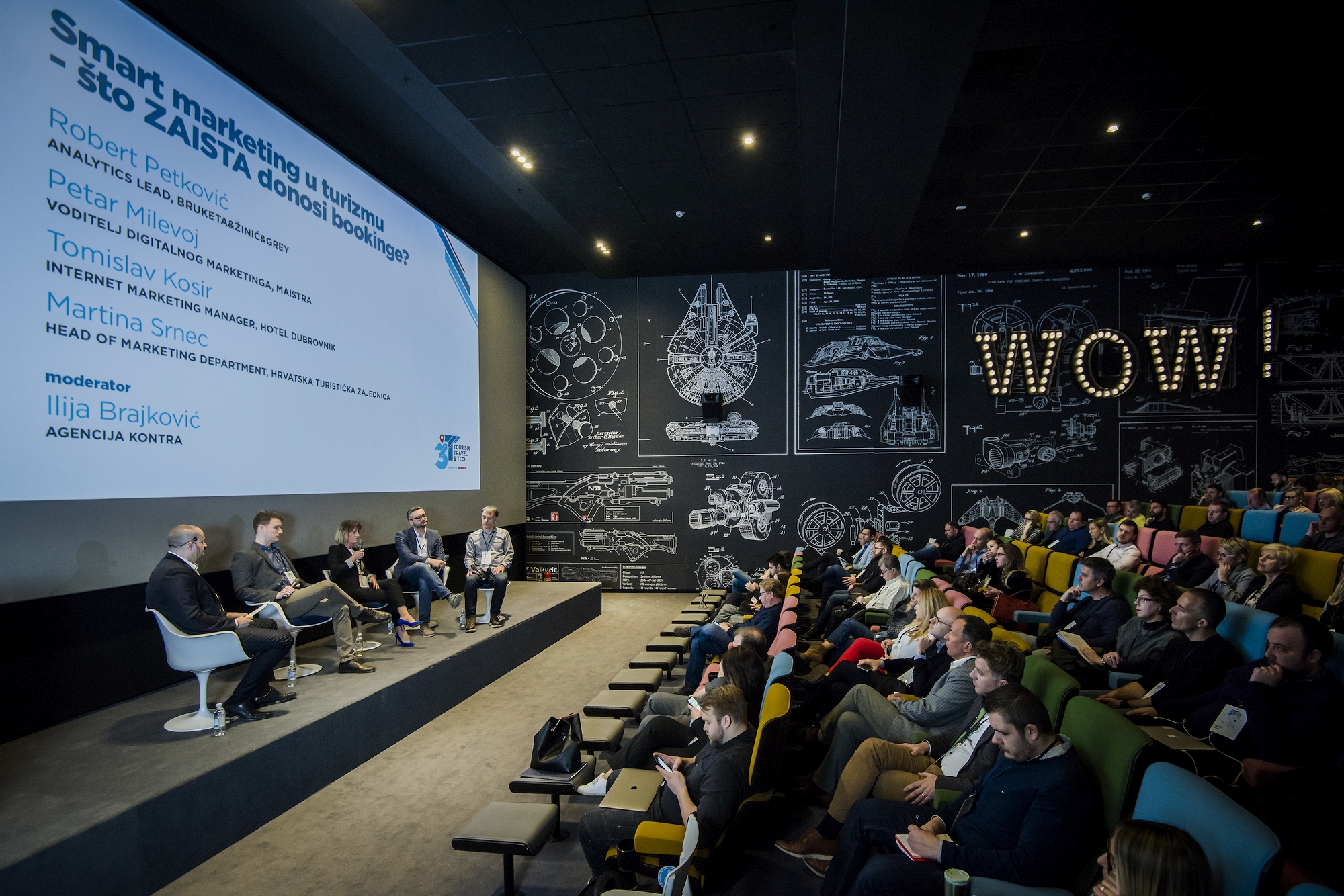
In the afternoon, there was another panel in which the topic "Croatian tourism in new technology surrounding – Growth limits" with moderator Željko Ivanković, from the Polazišta i perspektive think tank, was discussed.
The participants were Martina Nimac from the Croatian Chamber of Commerce, Neven Ivandić, from the Institute of Tourism, and Petar Rimac from the Expedia Group. Neven Ivandić presented the results of the research on some of the key issues of the sustainability of Croatian tourism and pointed out problems that come with the growth of tourism. The panellists debated on trends in other tourism destinations, like the shift from small family businesses to resorts, and adapting to the needs of tourists with digital solutions.
This years' 3T conference brought about new topics, interesting lectures and offered suggestions on how to deal with constant changes in tourism. The 3T conference is slowly building its brand, and it may well be the one in Croatia that helps tourism businesses to find appropriate solutions for their business processes along with the use of technology.
As Investments Fall, is Croatia's Hotel Business Stagnating?
As Marija Crnjak/Poslovni Dnevnik writes on the 12th of March, 2019, Croatia's hotel sector stagnated last year in terms of the number of new rooms and in the sense of the level of entry of foreign hotel brands. A lot of this, but of course not all of it, is because Croatia has deemed it more profitable to build and invest more in private accommodation, an often ''grey'' area of Croatia's tourism industry with much lower taxes and a very poor level of general regulation. The level of major investments in new hotel rooms has fallen significantly, the number of which grew by a mere one percent in one year.
Due to all the above mentioned conditions, the market is still dominated by local investors, quite a few new names have appeared on the scene in the last year, which are still to be properly positioned as hotel brands, according to the annual global report on hotel chains in 22 European countries, "European Chains & Hotels Report 2019" by the Horwath Consulting House HTL. In the Republic of Croatia, more than a quarter of these hotels, more specifically 186 of them, operate under 43 brands in total, of which 22 are local and 21 are international brands.
"High seasonality and an unfavourable environment for investors, especially with [granting the necessary] permits, are the main reason we're in 159th place on the Doing Business list, they're the biggest barriers for foreign investors, who find it difficult to decide on taking risks in developing projects in Croatia, although a few positive examples have occurred on the market which do lead to more optimism,'' stated Siniša Topalović from Horwath's Zagreb-based office.
Horwath's analysis, which is based on the numbers from Real Capital Analytic, only takes into account investments of more than 5 million dollars, reveals that investment in hotels in Croatia is down by as much as 90 percent, from 59 million euro to a mere 7 million euro.
''The growth of hotel brands in 2018 in Croatia (4 percent) should be observed through the proper placement of several local hotel names, and only time will reveal whether or not these names will be branded on the market,'' Topalović explained.
Additionally, although Croatia can be statistically put in a very good position in terms of the number of brands operating here, the market situation shows that the level of activity is lagging behind some countries which are considered to be weaker than Croatia. A good example of that is Serbia and its increasingly popular capital city of Belgrade, which has received 40 new hotels since 2014, with growth in the hotel sector in Belgrade mainly based on foreign investments and globally respected brands such as Crowne Plaza, Radisson Blu and Luxury Collection.
Although the RevPar (revenue per hotel room) rose by an average of 16 percent in Croatia in 2018, this year a slow down is expected, caused primarily by other Mediterranean countries which are recovering from their respective problems to return to the market (this includes longtime tourism kings like Turkey and Tunisia).
The main potential seems to lie outside of the height of the summer season. Along with Serbia, where further growth is expected in the hotel segment, Albania has some great potential for foreign investors, Albania currently has the smallest share of branded hotels per total number of rooms (2 percent), and Montenegro, Croatia's neighbour to the south, also offers investors fairly favourable investment conditions and is very active in encouraging a more luxurious tourist product for the country.
Greece, known for its numerous financial issues, has entered the world's top fifteen tourist destinations despite the country's somewhat infamous ups and downs, with 150 new luxury hotels ''born'' in Greece in 2018, becoming a destination in which more than one in five hotels is in the category of 4 or 5 stars. Last year, the largest amount of investments in hotels went from the United States across the Atlantic to Spain (2.1 billion euro), following came transactions from Israel to the United Kingdom totaling over one billion euro, French investors also invested 951 million euro into the United Kingdom.
Despite all of the potentially (and likely) damning economic risks from Brexit, one of the European continent's most powerful countries, the United Kingdom, had a total of nearly 4 billion euro in investment in its massive hotel business. In 22 countries from the Horwath analysis, there were a total of 146,600 hotels on the market last year with more than six million rooms, with an average of 61 rooms per hotel. The least-branded hotels had Albania, only 12, while France has 3885 hotels in the hotel chain.
Make sure to stay up to date with our dedicated business page for more on investment and doing business in Croatia.
Click here for the original article by Marija Crnjak for Poslovni Dnevnik
Pula's Arena Hospitality Group to Invest Almost 100 Million Euro by 2022
Pula's Arena Hospitality Group, which refers to itself as one of the most dynamic hospitality groups in Central and Eastern Europe, currently offers a portfolio of 26 owned, co-owned, leased and managed properties with more than 10,000 rooms and accommodation units here in Croatia, as well as in Germany and Hungary.
As Marija Crnjak/Poslovni Dnevnik writes on the 5th of March, 2019, the total investments of the Arena Hospitality Group in 2018 and 2019 amount to 447 million kuna in hotels and camps in both the Republic of Croatia and over in Germany, plus the 190 million kuna that the group plans to invest in the reconstruction of the much loved Hotel Brioni (Brijuni).
This was stated in the presentation of the Arena Hospitality Group's very impressive business results. The company claims it is also now ready for yet more new acquisitions across Central and Eastern Europe. As is already known, through public offers, the group collected a massive 788 million kuna back in 2017, and since then, they have invested on average three times more than before the public offer.
The Arena Hospitality Group is currently operating in the aforementioned three countries, under four brands, including Park Plaza and Art'otel, last year the company earned 758 million kuna in total revenue, an increase of 5.6 percent when compared to their record back in 2017, accompanied by healthy growth in all segments, hotels, tourist resorts and camp sites. In Croatia alone, they experienced handsome revenues of 503.8 million kuna.
After 2018's big investment in Glamping Arena One 99, worth 70 million kuna, this year, an investment of 128 million kuna is planned in Kažela camp, 60 million kuna is the planned amount to invest in Verudela Beach, a tourist resort, which should be completed by the year 2020, when the beginning of the works at Hotel Brioni (Brijuni) are planned. In the reconstruction of Art'otel Berlin Kudamm alone, the company will invest 53 million kuna.
Make sure to stay up to date on investments in Croatia, doing business in Croatia and everything in between by following our dedicated business page.
Click here for the original article by Marija Crnjak for Poslovni Dnevnik
Vir Tourism Presents Vir Island at Biggest Slovakian Tourism Fair
As eZadar writes on the 27th of January, 2019, at the ITF Slovakiatour 2019, the largest Slovak holiday and leisure fair which is currently marking 25 years of existence, the Vir Tourism tourist agency set up a stand with gifts for visitors to the fair, and held a presentation of the Croatian island in which the hall was filled to maximum capacity.
''We did a good job presenting the island and its tourist offer, and after the presentation there was quite a lot of interest in Vir. Of course, we did business with tour operators, agencies and tourism journalists who were fascinated by the number of Slovaks going on holiday to the island,'' says Srđan Liverić from the aforementioned Vir Tourism agency.
Liverić and the head of the agency, Mate Čulina, carried out most of the work directly with the fair's stand which attracted the attention of not only Slovak travellers and tourists, but also the director of the Croatian Tourist Board for the Czech Republic and Slovakia, Dubravko Miholić, who joined the Vir locals a week earlier at a similar fair in in Brno, Czech Republic.
The Slovak part of Vir's tourism promotion was held from January the 24th to the 27th, with a presentation in Bratislava, the participation of numerous representatives of the Slovakian media, investors and business partners of Vir's destination companies. As a travel and leisure fair, ITF Slovakiatour is one of the leading trade fairs in Slovakia for the tourism and hospitality sector.
Slovakiatour is an excellent opportunity to present tourism products and services, and all visitors can get information from tour operators, travel agencies, hoteliers and airlines so that they can organise their own holiday plans. Exhibitors like Vir Tourism used the fair to interact with potential buyers of services and other representatives of the tourism industry.
''This jubilee 25th ITF Slovakiatour was the most visited so far, and as the only Croatian promotion booth, all the attention of the Slovaks interested in spending their summer holidays in Croatia was directed towards us,'' stated Liverić, reporting on a good job well done in Bratislava.
This year's ITF Slovakiatour brought together 350 exhibitors from many countries from across the world, from Croatia, the Czech Republic, Cyprus, China and the Dominican Republic to Iran, Kenya, Cuba, Austria, Italy, Morocco and many others.
The numbers speak volumes about the significance of the Slovak tourist market for Vir island. Slovaks made up 12,833 tourist arrivals and 108,612 overnight stays, representing a growth of 19.5 percent (10.742 in 2017) in arrivals and 18 percent in nights (92.049).
Along with Slovenes, Hungarians and Germans, only the Slovaks made up more than 100,000 overnight stays and 10,000 arrivals last year, with continuous tourist growth from that market for Vir.
Follow our dedicated travel page for more.
Click here for the original article by Kazimir Skrbic for eZadar


